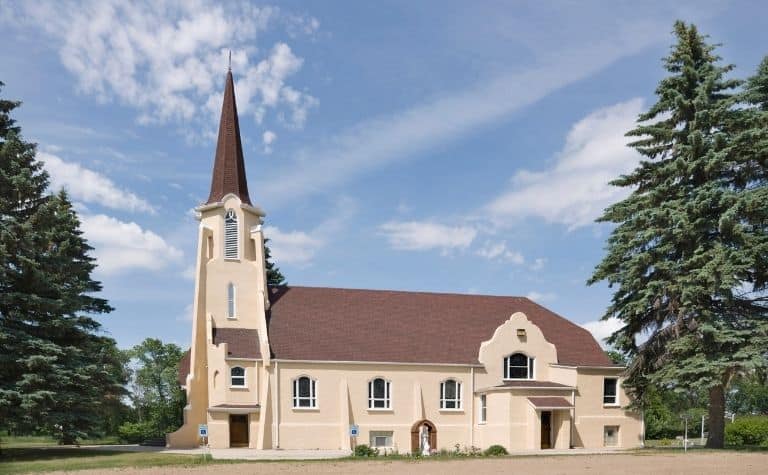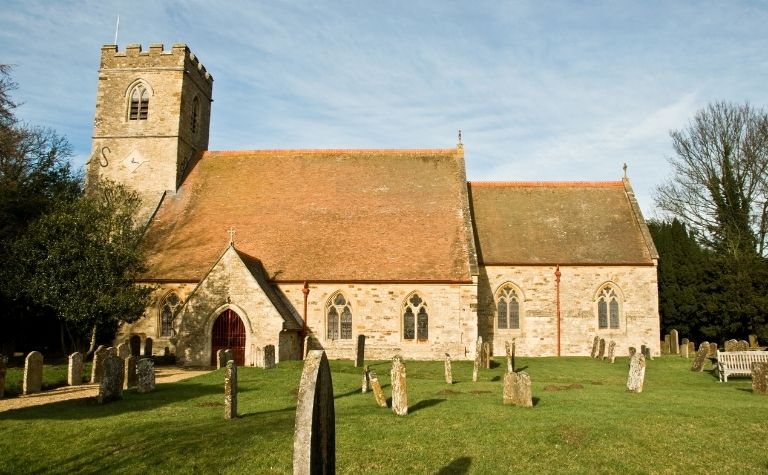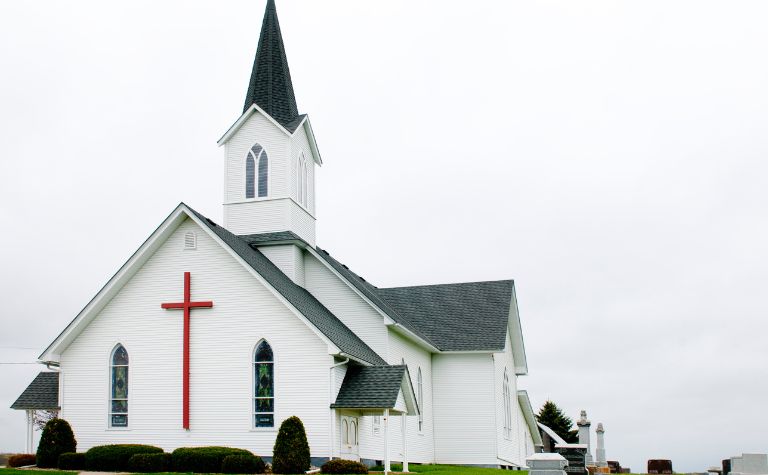Many people know that the terms “Protestant” and “non-denominational” are associated with Christianity. Sometimes the terms describe churches; other times, they describe people. But what is the difference between them?
The term “Protestant” describes one of the three historic branches of Christianity, the other two being Roman Catholicism and Eastern Orthodox. The term “non-denominational” describes certain churches that are Protestant in conviction but are not associated with one of the denominations in Protestantism.
When did Protestantism and non-denominational Christianity start? Are they theologically and socially conservative or liberal? What is the relationship between them? Do they have the same beliefs about God, the Bible, Jesus Christ, the Holy Spirit, and the end times? Keep reading to learn more.
Also, see Protestant vs. Catholic vs. Orthodox: Comparison to learn more.

Protestant Compared to Non-Denominational: Similarities and Differences
Non-denominational churches are a relatively recent phenomenon in Christianity, starting inside the Protestant tradition in the last few centuries. The vast majority of non-denominational churches today subscribe to Protestant beliefs and practices. (Also, see Protestant vs. Pentecostal: What’s the Difference?)
Some speculate that the non-denominational movement could not have started in Roman Catholicism or Eastern Orthodoxy because those traditions have a central leadership structure, which Protestantism does not have.
Another critically important requirement for the rise of non-denominational churches is that the movement take root in countries that champion religious freedom. People are not able to start new churches elsewhere in the world.
Non-denominational church planters, pastors, and members do not necessarily disagree with the historic theological tenets of Protestantism. (Also, see Protestant vs. Anglican: What’s the Difference?)
Rather, they express frustration with the bureaucracy found in mainline denominations and the drift away from orthodoxy and toward liberal and progressive viewpoints.
| Protestant | Non-Denominational | |
|---|---|---|
| Origin | 16th-century Europe, especially Germany, under the reforms of Martin Luther (1483-1546) | Non-denominational churches grew in number in the 2nd half of the 20th century, but the movement can be traced to the 19th century |
| Meaning of the name | The word “Protestant” comes from the Latin word protestari, meaning “to bear witness.” | “Non-denominational” refers to the fact that such churches do not have a formal connection to a historic Protestant denomination like Lutheranism, Presbyterianism, Methodism, Baptist, Episcopalian, or Assemblies of God. |
| Early influencer | Martin Luther, John Calvin of France (1509-1564), and Ulrich Zwingli of Switzerland (1484-1531) | There is not one single founder of non-denominational churches |
| Significant writing outside the Bible | The Apostles Creed, the Nicene Creed; the writings and sermons of Martin Luther, especially the 95 Theses, Calvin’s The Institutes of the Christians Religion; many others | The works important to non-denominational churches are mostly that are important to conservative evangelicalism. |
| Doctrinal emphasis | Protestantism contains Arminian, Calvinist, Baptist, and Pentecostal churches, and many others. | Varies widely from church to church; non-denominational churches can have any of the convictions found elsewhere in the Protestant tradition. |
| Church government | Protestant churches may have congregational, episcopalian, or presbyterian forms of church government. | Non-denominational churches are mostly congregational, but some are pastor or elder-led; none have state or regional ministerial organizations. |
| Pastor qualifications | Each denomination has its own criteria for licensure and ordination, which often includes certain levels of education and experience. | Non-denominational pastors have varying degrees of formal education, but most have attended a Bible college or seminary. |
| Theological and Social worldview | Protestants may be liberal or conservative theologically or socially; many mainline denominations have adopted liberal and progressive views in recent decades. | The vast majority of non-denominational churches are conservative theologically and socially; a commonality between many of them is frustration over mainline denomination’s movement away from conservative orthodoxy. |
Also, see Pentecostal vs. Charismatic: Comparison to learn more.

Protestant vs. Non-Denominational Beliefs and Practices
Why do so many non-denominational churches have Baptist-like practices? Many people have observed that non-denominational churches have similar practices to Baptist churches in areas like water baptism and church government. (Also, see Protestant vs. Baptist: What’s the Difference?)
Non-denominational churches commonly practice “believer’s baptism” instead of infant baptism. Their church government tends to be congregational, like Baptist churches. Why is this?
First, there are non-Baptist denominations that have these same practices, like the Assemblies of God. Second, these practices are common to denominations and movements founded in America.
The Baptist practice of only baptizing professing believers is rooted in the teachings of the New Testament.
However, baptizing only those who want to be baptized aligns with values championed in America, like individual freedom and autonomy. Likewise, congregational church government reflects democratic principles, which are also championed in America.
| Protestant | Non-Denominational | |
|---|---|---|
| Scripture | One of the hallmarks of the Protestant tradition is the authority of Scripture over and above church tradition. Protestants historically believe in the inspiration and authority of Scripture. | Non-denominational churches are generally evangelical and conservative; the authority, inspiration, and inerrancy of Scripture are often part of their doctrinal statements. |
| God | Protestants believe in the Trinity; there is one God who exists in three persons. The Father, Son, and Holy Spirit are each fully divine. | Non-denominational churches are also Trinitarian. |
| Christ | Jesus is the second person of the Trinity. He is God in human flesh. He is 100% God and 100% man. Jesus was born of a virgin, lived a sinless life, died as an atonement for sin, and was physically resurrection on the third day. | Non-denominational churches affirm the historical view of Protestantism regarding the person and work of Christ. |
| Salvation | Protestants believe that salvation is by grace through faith in Christ alone. Protestants can be Arminian, Calvinist, Baptist, or something else. | Non-denominational churches can be Calvinist or Arminian, but not Lutheran. Some welcome both Calvinists and Arminians. |
| Baptism | Generally, Protestants believe baptism identifies a person with the death and resurrection of Christ (Rom. 6:3-5) and obedience to Christ. It also signifies their inclusion into the church community (Acts 2:38-47). Protestants do not agree about who (children or adults) should be baptized and how (sprinkling or immersion). | Most practice “believer’s baptism,” which describes the conviction that only professing believers should be baptized; infants are not baptized, but children can be as soon as they are able to make a genuine profession of faith. |

| Protestant | Non-Denominational | |
|---|---|---|
| Communion | Generally, Protestants believe the Lord’s Supper is a continual practice that Christ started before his death and resurrection. Protestants don’t always agree about the nature of the bread and cup. | They are mostly seen as a memorial of the death of Christ, similar to Baptist and Assemblies of God churches. |
| Holy Spirit | The Holy Spirit is the third person of the Trinity. He is fully divine. The Spirit applies the salvation that the Father planned and that the Son earned for sinners. He bestows spiritual gifts on believers that they are to use for the edification of the Church. | Non-denominational churches affirm the deity of the Holy Spirit. Some non-denominational churches are Pentecostal, and some are not. |
| Speaking in tongues | Some Protestants are Pentecostal, and some aren’t. Some Protestants in non-Pentecostal churches speak in tongues. | Some non-denominational churches encourage speaking in tongues, and some do not. |
| The Return of Christ | Protestants believe in the Second Coming of Christ, which is a core belief in the tradition. | Non-denominational churches affirm the Second Coming of Christ. |
| Millennium | Protestant churches may be Premillennial, Postmillennial, or Amillennial. | Many are dispensational and premillennial. Those with Reformed theology may be Premillennial (similar to Reformed Baptists) or Amillennial. |
Also, see Protestant vs. Evangelical: What’s the Difference? to learn more.
Please see the related articles below.
References:
[1] Source
[2] Source
[3] Source
Related Questions
Catholic vs. Protestant vs. Orthodox: What's the Difference?
Roman Catholicism, Protestant Christianity, and the Eastern Orthodox Church are the three historical branches of the Christian religion. Each tradition traces its doctrines and practices to the New...
Protestantism and Anglicanism are branches of the Christian faith that have roots in Europe. Protestantism and Anglicanism have similarities and differences with each other as well as other...
